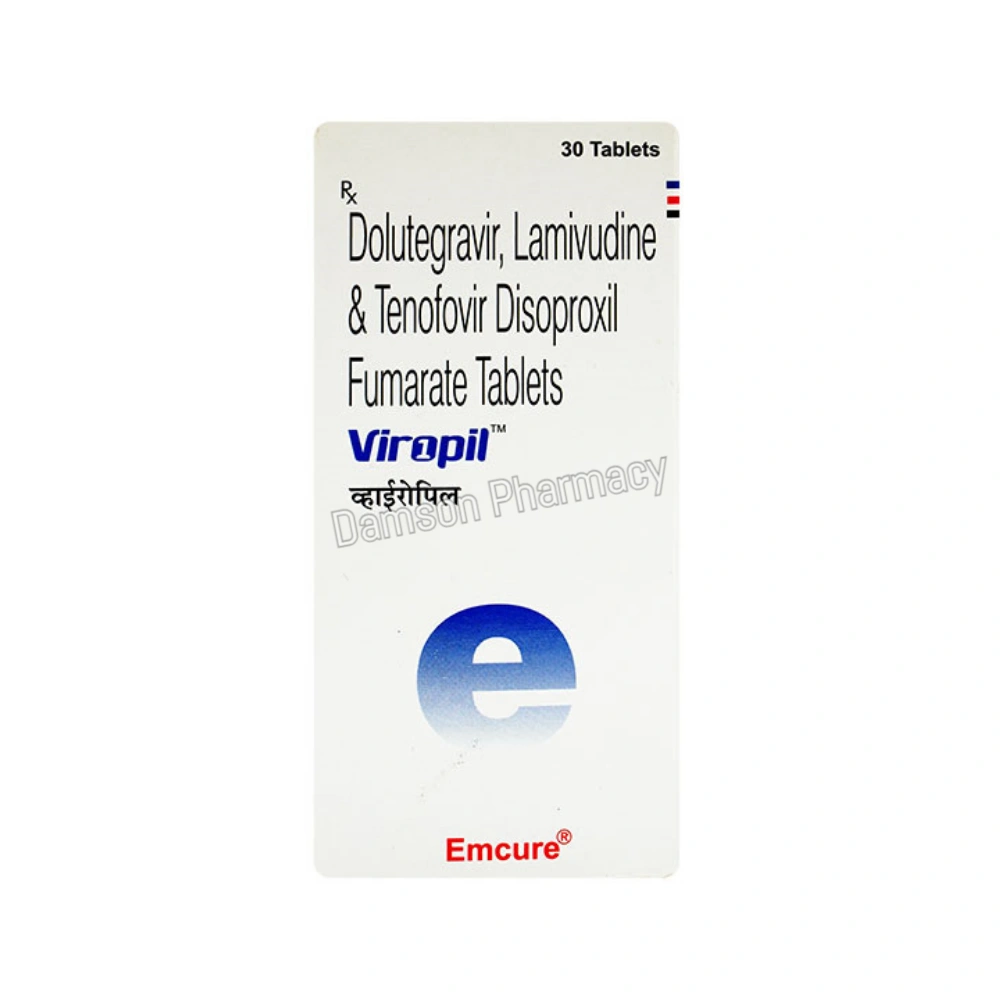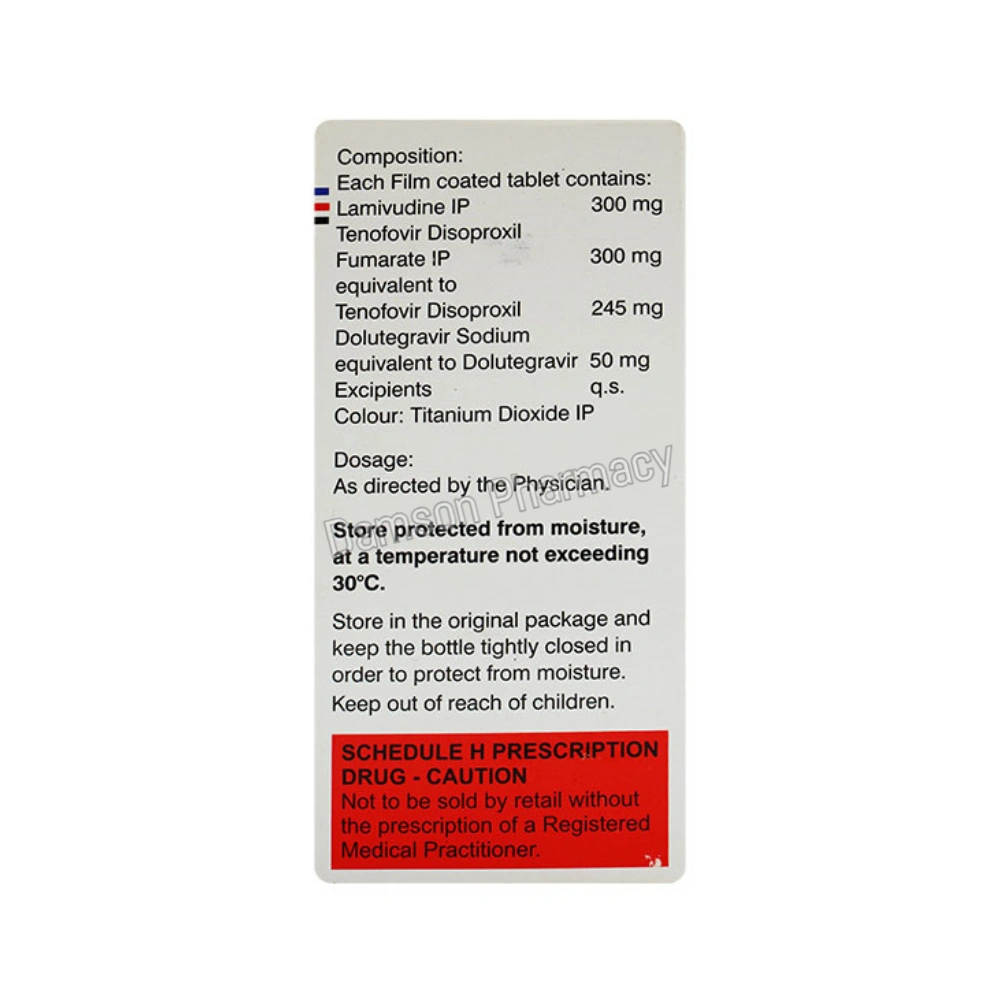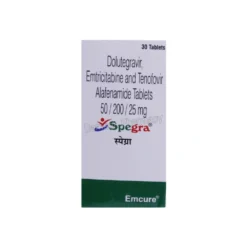Viropil Tablets
$90.00 – $261.00Price range: $90.00 through $261.00
| Pack Size | Price | Price / Unit | Quantity | |
|---|---|---|---|---|
| 30 Tablets | $90.00 | $3.00/ unit | ||
| 60 Tablets | $177.00 | $2.95/ unit | ||
| 90 Tablets | $261.00 | $2.90/ unit |
Looking for bulk / B2B pricing? | Send Inquiry |

| SKU | 11372 |
| Manufacturer | Emcure Pharmaceuticals Ltd |
| Categories | Anti HIV |
| Delivery Time | 10 - 14 Working Days |
Introduction to Viropil Tablets
Viropil Tablets are a combination antiretroviral medication used in the management of HIV-1 infection. It contains Dolutegravir, Lamivudine, and Tenofovir. These tablets are typically prescribed as a part of a long-term treatment plan under medical supervision.
Viropil is designed for adults and adolescents weighing at least 40 kg. It is generally taken once daily and helps in controlling the HIV virus, thereby improving immune function and reducing the risk of HIV-related complications.
This medicine is not a cure for HIV but helps in reducing the viral load to undetectable levels when used consistently. Patients taking Viropil must adhere to a regular dosing schedule for maximum effectiveness.
Viropil Tablets are available only by prescription and must be used exactly as directed by a healthcare professional. Routine blood tests and check-ups are usually required to monitor the patient’s response and overall health during treatment.
Uses of Viropil Tablet
- HIV Infection Treatment
- Suppression of Viral Replication
- Reduction of Viral Load
- Improvement of CD4 Cell Counts
How Does Viropil Tablet Works?
Viropil Tablet works by combining three antiretroviral agents—Dolutegravir, Lamivudine, and Tenofovir—that target different stages of the HIV life cycle. This combination helps prevent the virus from multiplying and spreading within the body, thereby reducing the overall viral load.
By lowering the amount of HIV in the blood, Viropil allows the immune system to strengthen and function more effectively. Consistent use of this medication helps maintain viral suppression, improves quality of life, and lowers the risk of HIV-related complications.
Side Effects of Viropil Tablet
Common Side Effects
- Nausea or diarrhea
- Headache
- Fatigue
- Trouble sleeping (insomnia)
- Mild abdominal discomfort
- Skin rash
- Dizziness
Serious Side Effects
- Severe allergic reaction to Abacavir (hypersensitivity)
- Liver problems
- Changes in mood or behavior (including depression)
- Lactic acidosis (rare)
- Severe skin reactions
How To Manage Side Effects?
- Communicate with Your Healthcare Provider
- Follow the Prescribed Dosage and Schedule
- Take Viropil with Food
- Stay Hydrated
- Prioritize a Balanced Diet
- Monitor Your Mental Health
- Attend Regular Check-Ups
- Keep a Symptom Diary
Warnings & Precautions
1. Not for Hepatitis B Alone:
- Do not use Viropil for treating hepatitis B alone, as stopping it may worsen liver infection.
2. Monitor Kidney Function:
- Tenofovir in Viropil may affect kidney health; regular kidney function tests are recommended.
3. Avoid Alcohol Consumption:
- Alcohol can increase the risk of liver damage while taking Viropil; avoid or limit its use.
4. Use Effective Contraception:
- Women of childbearing age should use reliable birth control to prevent pregnancy during treatment with Viropil.
5. Check for Drug Interactions:
- Inform your doctor about all medications, as Viropil can interact with drugs like rifampicin or antacids.
6. Do Not Skip Doses:
- Missing doses can lead to drug resistance and reduced treatment effectiveness; take Viropil exactly as prescribed.
7. Regular Monitoring Needed:
- Periodic blood tests are necessary to check liver function, viral load, and CD4 count during treatment.
Storage
- Store at room temperature between 20°C to 25°C.
- Keep the tablets in the original container, tightly closed.
- Protect from moisture, heat, and direct sunlight.
- Do not store in the bathroom or humid areas.
- Keep out of reach of children and pets.
- Do not use tablets past the expiration date.
Frequently Asked Questions
1. Can Viropil Tablet Prevent HIV Transmission To Others?
Ans. Viropil Tablet helps lower your viral load, but it does not replace safe practices. You should still use protection and follow precautions to avoid transmission.
2. How Long Should I Continue Taking Viropil Tablet?
Ans. Viropil Tablet is usually taken for life or as long as prescribed, depending on your viral load, CD4 count, and overall health condition.
3. Can I Stop Taking Viropil Tablet If I Feel Better?
Ans. No, you should never stop taking Viropil Tablet without your doctor’s guidance, as doing so can cause viral resistance and worsen your condition.
| Pack Size | 30 Tablets, 60 Tablets, 90 Tablets |
|---|---|
| Price/Unit | $2.90/unit, $2.95/unit, $3.00/unit |
Be the first to review “Viropil Tablets” Cancel reply
Related Products
Anti HIV










Reviews
There are no reviews yet.